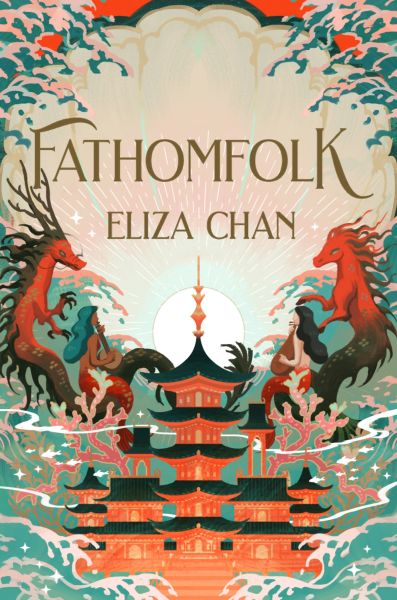Here Beside The Rising Tide
Fathomfolk (Drowned City, volume 1)
By Eliza Chan

1 Mar, 2024
2024’s Fathomfolk is the first entry in Eliza Chan’s Drowned City secondary-fantasy-world series.
Mixed-race Mira is all siren in the eyes of the humans who run the semi-submerged city Tiankawi; she’s also permanently second-class thanks to her Fathomfolk blood. A career spent proving herself to the humans earns historical recognition: Mira is promoted to captain of the border guard, the first Folk to be deemed worthy of such a rank.
The rank comes with unpleasant baggage, not least of which is the fact that her job will consist almost entirely of keeping her fellow Folk in line.
Thanks to humans’ boundless industrial and scientific ingenuity, the world is warming, the oceans are rising, and the seas are increasingly polluted. This is bad for everyone but worst for the ocean-living Fathomfolk. Driven out of the sea in increasing numbers, the Folk refugees are relegated to the lowest social rank, and forced to wear pakalots, magical bracelets that prevent them from using their race’s magical talents to harm humans.
Thanks to the tireless efforts of Folk like half-siren Mira and her dragon lover Kai, the humans have been swayed. Perhaps the Folk are in a sense people. Perhaps pakalots are an overreaction. A golden age of grudging liberalism looms. Or so it seems.
The seawitch Cordelia manages a double life. As seawitch Cordelia, she is a gray market powerbroker with a talent for evading arrest. As Serena she is the entirely human wife of high-ranking functionary Samnang. Determined to ensure her children’s future, she guides her naïve husband towards ever greater rank. Her plans depend on current arrangements; reform is unacceptable.
Kai’s sister Nami is a political activist who is passionate, but blind to subtext and the possible consequences of her actions. One of her bold gestures lands two of Nami’s friends in jail. Nami herself is simply sent off to join Kai in Tiankawi. Perhaps Nami can learn from the example of her hard-working, prudent brother… but probably not.
It takes Nami surprisingly little time to meet and fall for dashing activist Firth. Firth believes in deeds, not words! Firth believes consequences are for other people! Firth believes a dragon like Nami could be invaluable to his latest bold scheme, one that the city may not survive.
~oOo~
Fathomfolk are also called Folk, presumably because saying all of Fathomfolk was ever so tiring for the humans.
It’s a mistake to overthink secondary fantasy universes… so let’s do that.
This is a setting in which each race save for humans has specific magical gifts (humans got ingenuity instead of magic1). All races seem to be interfertile2. The main factor keeping the various flavors of people distinct is geographic separation, each group preferring different environments. But… whatever social barriers prevented intermarriage have been weakened by forced proximity. What happens after a couple of centuries of intermarriage will be fascinating, if the humans don’t manage to kill the planet first.
While there are human characters in the novel (mostly duplicitous, status-conscious dickheads who will be first against the wall when the revolution comes), humans are supporting characters. The focus is on various Folk working at cross-purposes, each trying to better themselves and those they love.
This narrative strategy has curious consequences. Rather than humans having to actively intervene to stay on top, the Folk manage to preserve the status quo for the humans. Cordelia does so deliberately because she directly benefits; Mira hopes that being a model minority will lead to incremental reform; while Nami’s efforts to fight the power inevitably justify more stringent anti-Folk laws. The humans can just sit on their hands and still win, because the people they are subjugating do all the heavy lifting. It’s an elegant arrangement, if disheartening if one takes a larger view3.
I was distracted from the plot by the characters in this novel. Rather, I was distracted by one character in particular. To know Nami is to loathe her with the heat of a thousand exploding suns. Not only do her gambits routinely undermine the cause for which she fights, not only is she persistently blind to little red flags like casual murder, not only does she leave chaos and death in her wake, she is incapable of learning from experience. Unfortunately for society, Nami has a remarkable talent for convincing people to give her second chances.
I cannot deny that Nami is effectively depicted, but my desire not to spend more time in her head will probably deter me from reading the second volume. Your mileage may vary.
Fathomfolk is available here (Amazon US), here (Amazon Canada), here (Amazon UK), here (Apple Books), here (Barnes & Noble), here (Chapters-Indigo), and here (Words Worth Books).
1: Judging by results, being cunning is a much better knack than gifts like alluring voices or trade-based wishes. If you’re smart enough, you can get the magical people to use their powers on your behalf.
2: Although most mixed-race people seem to be part-human. Maybe humans have also been gifted with attractiveness. More likely this is just a side effect of the social stratification of this time. People marrying up pretty much have to marry human… or possibly dragon.
3: Larger view unless you’re the sort of person who finds liberation by impending mass extinction and subsequent societal collapse heartening.
